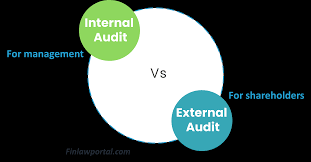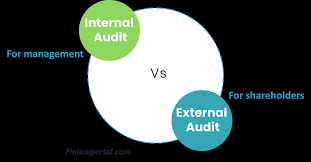
Introduction to the Difference Between Internal Audit and Statutory Audit
Internal audit and statutory audit are two types of audits that companies may undertake to ensure that their operations are conducted in a responsible and effective manner. While both audits involve the examination of a company’s financial records, they differ in their purpose, scope, and the party responsible for conducting the audit.
The main difference between internal audit and statutory audit is conducted by an internal auditor who is an employee of the company and reports to the management. The purpose of an internal audit is to provide independent assurance to a company’s management that its operations are effective, efficient, and comply with internal policies and procedures. The scope of an internal audit is determined by the company’s management and is focused on assessing the effectiveness of the company’s internal controls, risk management, and governance processes. The internal auditor provides management with recommendations for improving the company’s operations and internal controls.
On the other hand, a statutory audit is conducted by an external auditor who is independent of the company and reports to the shareholders. The purpose of a statutory audit is to provide assurance to the company’s shareholders, lenders, and other stakeholders that the financial statements of the company present a true and fair view of its financial position.
The scope of a statutory audit is determined by the Companies Act and accounting standards and is focused on examining the company’s financial statements, accounting records, and other relevant documents to ensure that they comply with applicable laws and regulations. The external auditor provides the shareholders with an opinion on the financial statements of the company, including any material misstatements or non-compliance with applicable laws and regulations.
The party responsible for conducting the audits also differs. An internal audit is conducted by an internal auditor who is appointed by the company’s management, while the statutory audit is conducted by an external auditor who is appointed by the company’s shareholders. The external auditor is independent of the company and is required to follow professional auditing standards and regulations.
While both internal audit vs statutory audit involve the examination of a company’s financial records, they serve different purposes, have different scopes, and are conducted by different parties. Internal audit is focused on assessing the effectiveness of a company’s internal controls and risk management processes, while statutory audit is focused on ensuring that a company’s financial statements are accurate, complete, and comply with applicable laws and regulations.
The responsibility for conducting these audits also differs, with internal audit being conducted by an internal auditor appointed by the company’s management, and statutory audit being conducted by an external auditor appointed by the company’s shareholders.

Table of Contents
Comparison Table for Internal Audit Vs Statutory Audit
Here is a table outlining the key differences between internal audit and statutory audit:
| Internal Audit | Statutory Audit | |
|---|---|---|
| Purpose | To provide independent assurance to management that operations are effective, efficient, and comply with internal policies and procedures. | To provide assurance to shareholders, lenders, and other stakeholders that financial statements present a true and fair view of the company’s financial position. |
| Scope | Determined by management, focused on assessing the effectiveness of internal controls, risk management, and governance processes. | Determined by the Companies Act and accounting standards, focused on examining financial statements, accounting records, and other relevant documents to ensure compliance with applicable laws and regulations. |
| Responsibility | Conducted by an internal auditor appointed by the company’s management. | Conducted by an external auditor appointed by the company’s shareholders. |
| Reporting | Reports to management and provides recommendations for improving operations and internal controls. | Reports to shareholders and provides an opinion on the accuracy and completeness of financial statements and compliance with applicable laws and regulations. |
| Frequency | Conducted regularly, often quarterly or annually. | Conducted once a year, as required by law. |
| Legal Requirement | No legal requirement, but may be required by regulatory bodies or management. | Mandatory for all companies registered under the Companies Act, 2013. |
| Independence | Reports to management, may be influenced by management. | Independent of the company, required to follow professional auditing standards and regulations. |
In summary, internal audit vs statutory audit are two types of audits that serve different purposes, have different scopes, and are conducted by different parties. Internal audit is focused on assessing the effectiveness of internal controls and risk management processes,
while statutory audit is focused on ensuring compliance with applicable laws and regulations and providing assurance to shareholders and other stakeholders. The responsibility for conducting these audits differs, with internal audit being conducted by an internal auditor appointed by management and statutory audit being conducted by an external auditor appointed by shareholders.

Pointwise Difference for Internal Audit Vs Statutory Audit
Here are the key point-wise differences between Internal Audit vs Statutory Audit:
- Purpose:
- Internal Audit is conducted to provide independent assurance to management that operations are effective, efficient, and comply with internal policies and procedures.
- Statutory Audit is conducted to provide assurance to shareholders, lenders, and other stakeholders that financial statements present a true and fair view of the company’s financial position.
- Scope:
- Internal Audit is determined by management and focused on assessing the effectiveness of internal controls, risk management, and governance processes.
- Statutory Audit is determined by the Companies Act and accounting standards, focused on examining financial statements, accounting records, and other relevant documents to ensure compliance with applicable laws and regulations.
- Responsibility:
- Internal Audit is conducted by an internal auditor appointed by the company’s management.
- Statutory Audit is conducted by an external auditor appointed by the company’s shareholders.
- Reporting:
- Internal Audit reports to management and provides recommendations for improving operations and internal controls.
- Statutory Audit reports to shareholders and provides an opinion on the accuracy and completeness of financial statements and compliance with applicable laws and regulations.
- Frequency:
- Internal Audit is conducted regularly, often quarterly or annually.
- Statutory Audit is conducted once a year, as required by law.
- Legal Requirement:
- Internal Audit has no legal requirement but may be required by regulatory bodies or management.
- Statutory Audit is mandatory for all companies registered under the Companies Act, 2013.
- Independence:
- Internal Audit reports to management, and may be influenced by management.
- Statutory Audit is independent of the company, is required to follow professional auditing standards and regulations.
Internal Audit vs Statutory Audit serve different purposes, have different scopes, and are conducted by different parties. Internal Audit is focused on assessing the effectiveness of internal controls and risk management processes, while Statutory Audit is focused on ensuring compliance with applicable laws and regulations and providing assurance to shareholders and other stakeholders.
The responsibility for conducting these audits differs, with Internal Audit being conducted by an internal auditor appointed by management and Statutory Audit being conducted by an external auditor appointed by shareholders.

What is Internal Audit?
Internal Audit is an independent, objective assurance and consulting activity designed to add value and improve an organization’s operations. It is a systematic and comprehensive evaluation of an organization’s risk management, internal controls, and governance processes. The primary objective of Internal Audit is to provide assurance to management that operations are effective, efficient, and comply with internal policies and procedures.
In a listed company, Internal Audit plays a crucial role in providing assurance to the board of directors and shareholders that the company’s operations are being conducted in a controlled and efficient manner. The Internal Audit function in a listed company is responsible for conducting regular audits of the company’s financial and non-financial processes to ensure compliance with applicable laws, regulations, and internal policies and procedures.
For example, let’s consider the Internal Audit function in a listed manufacturing company. The Internal Audit team is responsible for conducting regular audits of the company’s financial processes, such as accounts receivable, accounts payable, and inventory management. The team also conducts audits of the company’s non-financial processes, such as procurement, production, and quality control.
During an audit of the company’s procurement process, the Internal Audit team may review the procurement policies and procedures, examine purchase orders, and verify that the company is obtaining goods and services at the best possible price. The team may also review the contracts and agreements entered into with suppliers to ensure that they are legally binding and in compliance with applicable laws and regulations.
Similarly, during an audit of the company’s production process, the Internal Audit team may review the production schedule, examine the quality control procedures, and verify that the products are being manufactured according to the company’s standards. The team may also review the maintenance records of the production equipment to ensure that they are being properly maintained and serviced.
In conclusion, Internal Audit is an important function in a listed company that provides assurance to management, the board of directors, and shareholders that the company’s operations.
What is Statutory Audit?
Statutory Audit is an independent audit of a company’s financial statements and accounting records conducted by a licensed and qualified auditor. The primary objective of Statutory Audit is to provide an opinion on whether a company’s financial statements are accurate and reliable and whether they have been prepared in accordance with applicable accounting standards, laws, and regulations.
In a listed company, Statutory Audit is required by law and plays a crucial role in maintaining the integrity of financial reporting and ensuring that investors have access to accurate and reliable financial information. The Statutory Audit is conducted by an external auditor who is appointed by the shareholders of the company.
For example, let’s consider a listed company that operates in the retail industry. The company’s financial statements are required to be audited annually by an external auditor to ensure that they are accurate and reliable. The Statutory Audit of the company’s financial statements includes the following steps:
- Planning: The external auditor will plan the audit by understanding the company’s business, identifying key risks, and designing audit procedures to address those risks.
- Fieldwork: The external auditor will conduct fieldwork by gathering evidence through testing of the company’s financial transactions, account balances, and internal controls.
- Reporting: Based on the evidence gathered, the external auditor will form an opinion on whether the company’s financial statements are accurate and reliable and whether they have been prepared in accordance with applicable accounting standards, laws, and regulations.
- Communication: The external auditor will communicate the audit findings to the company’s management and board of directors and make recommendations for improvements in internal controls and accounting practices.
The Statutory Audit provides assurance to the shareholders and other stakeholders of the listed company that the financial statements are prepared in accordance with applicable laws, regulations, and accounting standards. It also helps to identify weaknesses in the company’s internal controls and accounting practices, which can lead to improvements in the company’s operations and financial reporting.
In conclusion, Statutory Audit is an independent audit of a company’s financial statements and accounting records conducted by a licensed and qualified auditor. It plays a crucial role in maintaining the integrity of financial reporting and ensuring that investors have access to accurate and reliable financial information.
In a listed company, the Statutory Audit is required by law and provides assurance to shareholders and other stakeholders that the financial statements are accurate and reliable and have been prepared in accordance with applicable laws, regulations, and accounting standards.
Examples of Internal Audit vs Statutory Audit
Let’s take the example of a multinational company XYZ to understand the difference between Internal Audit and Statutory Audit.
Internal Audit is a function that evaluates and improves the effectiveness of an organization’s risk management, control, and governance processes. In the case of XYZ, the internal audit team would be responsible for reviewing the company’s operations and financial systems to identify areas of risk and recommend controls and process improvements.
For example, the internal audit team may conduct a review of XYZ’s accounts payable process to ensure that invoices are being processed accurately and in a timely manner. They may also review the company’s inventory management process to ensure that inventory levels are accurately reported and that there are adequate controls in place to prevent theft or loss.
On the other hand, Statutory Audit is an independent audit of a company’s financial statements and accounting records conducted by a licensed and qualified auditor. In the case of XYZ, a statutory audit would be conducted by an external auditor who is appointed by the shareholders of the company.
For example, the external auditor would review XYZ’s financial statements to ensure that they are prepared in accordance with generally accepted accounting principles (GAAP). The auditor would also review the company’s internal controls to ensure that they are effective in preventing and detecting fraud and financial misstatements.
The main difference between Internal Audit and Statutory Audit is the scope of their work. Internal Audit is focused on evaluating and improving the effectiveness of an organization’s risk management, control, and governance processes. Statutory Audit, on the other hand, is focused on providing an opinion on the accuracy and reliability of a company’s financial statements.
To illustrate this further, let’s assume that XYZ has a weakness in its inventory management process that was identified by the internal audit team. The internal audit team would recommend process improvements to management to address this weakness. However, this weakness may not necessarily result in a material misstatement in XYZ’s financial statements.
References for Internal Audit vs Statutory Audit
- https://www.icai.org/new_post.html?post_id=597
- https://www.icai.org/post/aasb-eoi-statutory-audit-of-entities

